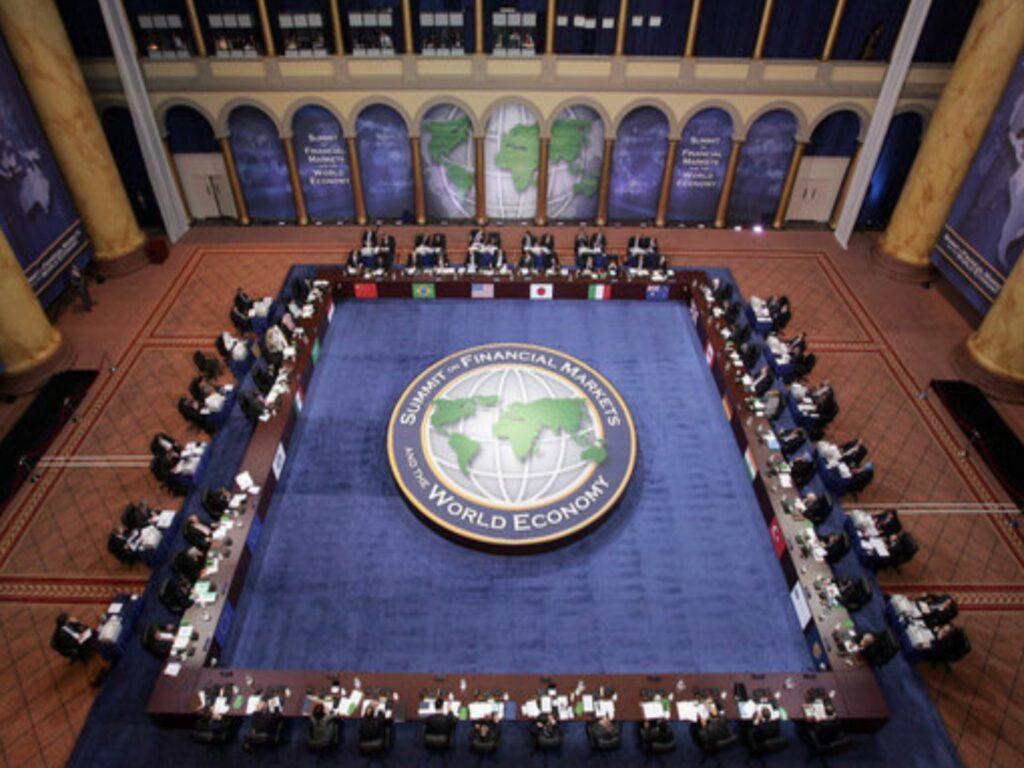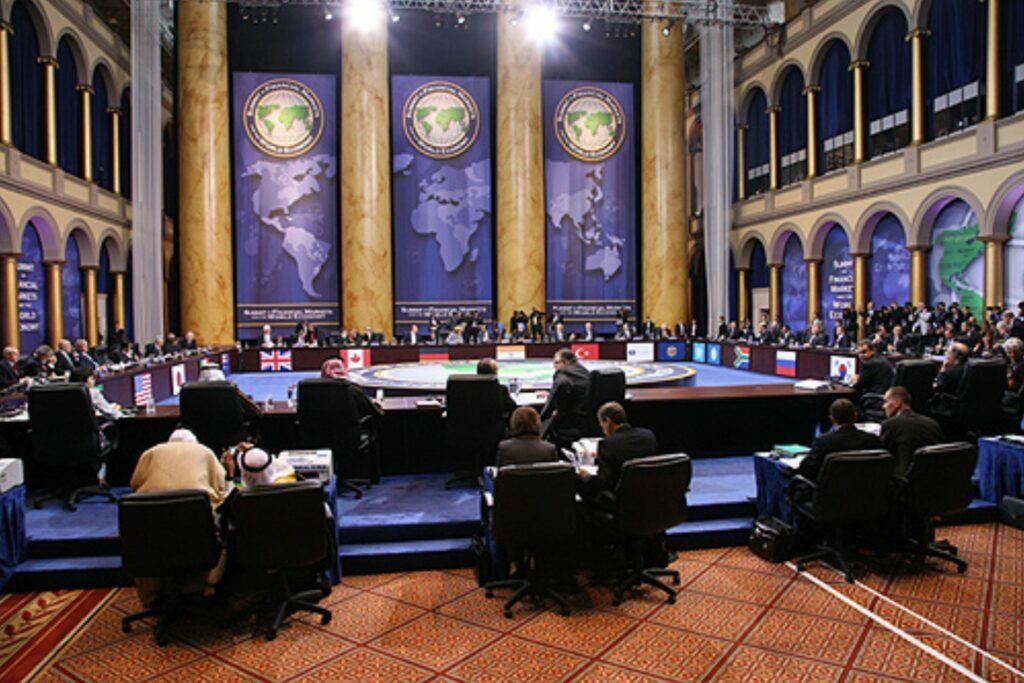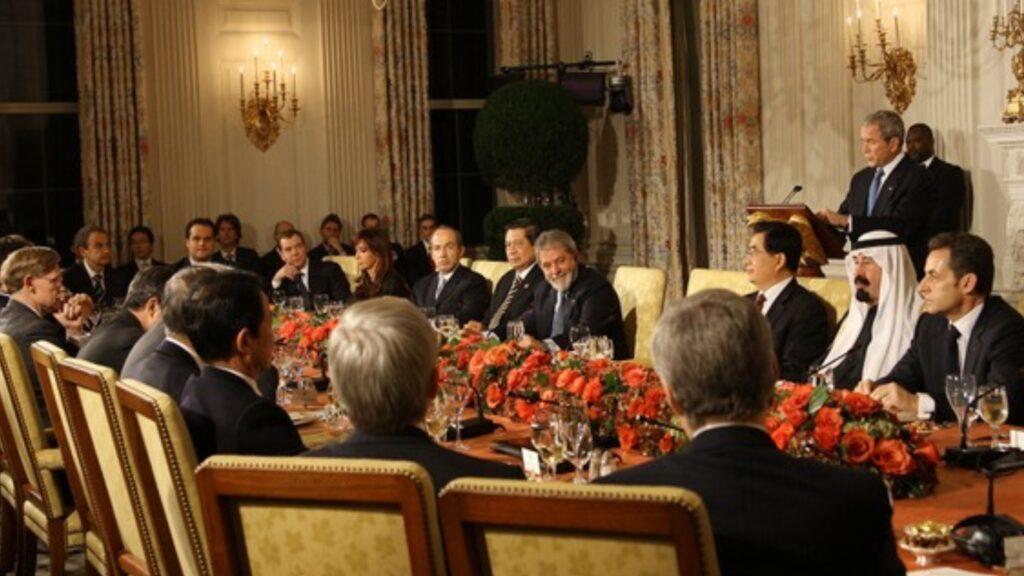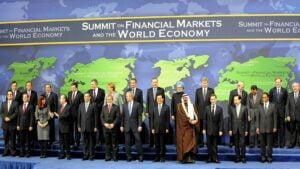2008 G20 Washington summit
| G20 Summit on Financial Markets and the World Economy | |
| |
| Date | November 14 and 15, 2008 |
| Venue(s) | National building Museum Washington, D.C, United States |
| Participants | G20 |
| Precedes | 2009 G20 London Summit |
| key points | |
| |
Preliminary history
Approaches in the early 2000s
Bretton Woods II was an unofficial name for the way that currencies were handled in the 2000s. Daniel Drezner, a political economist, said, “Under this system, the U.S. is running huge current account deficits so that other countries can grow through exports.” For this reason, central banks are buying dollars and assets priced in dollars. This is especially true for banks on the Pacific Rim.
According to a 2004 paper by Dooley, Folkerts-Landau, and Garber, the idea of a “revived Bretton Woods system” came about after the end of the Cold War when countries, mostly in Asia, “opted for the same periphery strategy as immediate post-war Europe and Japan, undervaluing the exchange rate, managing large foreign exchange interventions, imposing controls, building up reserves, and encouraging export-led growth by Roubini and Setser wrote in 2005, “If the US does not take steps to reduce its need for external financing before it runs out of central banks’ willingness to keep adding to their dollar reserves, and if the rest of the world does not take steps to reduce its dependence on an unsustainable expansion in US domestic demand to support its own growth, the risk of a hard landing for the US and global economy will grow…. a sharp fall in the value of their currency.” The change in the prices of assets would cause the US economy to slow down significantly. As a result, US imports would drop, which would cause the world economy to slow down significantly, if not go into recession.
Financial crisis of 2007–
According to Nicolas Sarkozy, the president of France, on September 26, 2008, “We must rethink the financial system from scratch, as at Bretton Woods.”
British Prime Minister Gordon Brown said on October 13, 2008, that world leaders needed to get together to agree on a new economic system. “We must have a new Bretton Woods, building a new international financial architecture for the years ahead.” Unlike the original Bretton Woods system, Brown’s plan emphasized continuing globalization and free trade over a return to set exchange rates. In a disagreement, Sarkozy said that the “Anglo-Saxon” model of free markets has not worked.
The economics minister of Italy, Giulio Tremonti, said that his country would push for a “New Bretton Woods” while it was chairman in 2009. His opinion on the U.S.’s response to the 2008 global financial crisis was not favorable, and he stated that the dollar might not be the best choice as the base currency for the Bretton Woods system. An American political organizer named Lyndon LaRouche had been pushing for a new Bretton Woods agreement for many years, Tremonti told the Italian newspaper Corriere della Sera on October 20, 2008.
The Summit

“G7 plus” is the code. Governors from the G20 countries will meet at the meeting, which US President George W. Bush announced. It was decided that the G20 would work to “promote international financial stability” in response to the financial problems of 1997–1999. There are 192 governments that are members of the United Nations, but over 170 governments are not in the G20. These are countries that are thought to be systemically important.
Financial markets and the world economy were the topics of the first G20 leaders’ meeting, which took place at the National Building Museum in Washington, D.C., on November 14 and 15, 2008. France, Germany, India, Indonesia, Italy, Japan, Mexico, the Republic of Korea, Russia, Saudi Arabia, South Africa, Turkey, the United Kingdom, the United States of America, the European Union (represented by Nicolas Sarkozy, President of the European Council, and José Manuel Barroso, President of the European Commission), and the Netherlands (allowed extra time). Dutch Prime Minister Jan Peter Balkenende arrived at Andrews Air Force Base in the evening of November 14, but as soon as he heard that his father had died, he went back to the Netherlands. Instead, State Secretary Jan Kees de Jager represented the Netherlands.
On the first try, José Luis Rodríguez Zapatero, the prime minister of Spain, was not invited to the summit. He was “so desperate to secure an invitation” that he went “to Asia to seek the help of President Hu Jintao of China.” Zapatero finally got an invitation from “intense lobbying” French President Nicolas Sarkozy, who had two tickets available (the second one was because France was the Presidency of the Council of the European Union at the time).
Core participants
Core members of the G20, which is made up of 19 countries, and the European Union, which is represented by its two governing bodies, the European Council and the European Commission, will be at the Washington summit. Other countries and regional organizations have also been invited to take part.


| Core G20 Members Host nation and leader are indicated in bold text | |||
| Member | Represented by | Title | |
| 🇦🇷 | Argentina | Cristina Fernández de Kirchner | President |
| 🇦🇺 | Australia | Kevin Rudd | Prime Minister |
| 🇧🇷 | Brazil | Luiz Inácio Lula da Silva | President |
| 🇨🇦 | Canada | Stephen Harper | Prime Minister |
| 🇨🇳 | China | Hu Jintao | President |
| 🇫🇷 | France | Nicolas Sarkozy | President |
| 🇩🇪 | Germany | Angela Merkel | Chancellor |
| 🇮🇳 | India | Manmohan Singh | Prime Minister |
| 🇮🇩 | Indonesia | Susilo Bambang Yudhoyono | President |
| 🇮🇹 | Italy | Silvio Berlusconi | Prime Minister |
| 🇯🇵 | Japan | Tarō Asō | Prime Minister |
| 🇲🇽 | Mexico | Felipe Calderón | President |
| 🇷🇺 | Russia | Dmitry Medvedev | President |
| 🇸🇦 | Saudi Arabia | Abdullah bin Abdul Aziz | King |
| 🇿🇦 | South Africa | Kgalema Motlanthe | President |
| 🇰🇷 | South Korea | Lee Myung-bak | President |
| 🇹🇷 | Turkey | Recep Tayyip Erdoğan | Prime Minister |
| 🇬🇧 | United Kingdom | Gordon Brown | Prime Minister |
| 🇺🇸 | United States | George W. Bush | President |
| 🇪🇺 | European Union (European Commission) | Jose Manuel Barroso | President |
| Invited States | |||
| State | Represented by | Title | |
| 🇳🇱 | Netherlands | Jan Peter Balkenende | Prime Minister |
| 🇪🇸 | Spain | José Luis Rodríguez Zapatero | Prime Minister |
| International Organisations | |||
| Organisation | Represented by | Title | |
| Financial Stability Forum | Mario Draghi | Chairman | |
| International Monetary Fund | Dominique Strauss-Kahn | Managing Director | |
| 🇺🇳 | United Nations | Ban Ki-moon | Secretary General |
| World Bank Group | Robert Zoellick | President | |
Suggestions
Angela Merkel, the chancellor of Germany, and Nicolas Sarkozy, the president of France, both said that “Bretton Woods II” should lead to “real, inclusive reform of the international financial system.” The European Union Council views the meeting as “taking early decisions on transparency, global standards of regulation, cross-border supervision, and crisis management, to avoid conflicts of interest and to create an early warning system, so as to engender confidence among savers and investors in every country.” A spokesman for US President George W. Bush said of the meeting, “Leaders will review progress being made to address the current financial crisis, advance a common understanding of its causes, and, in order to avoid a repeat, agree on a common set of principles for reform of the regulatory and institutional regimes for the world’s financial sector.” During a speech in the middle of October, UK Prime Minister Gordon Brown laid out a number of main ideas. Honesty (credit agencies, executive pay), responsibility (board member skills and knowledge), and sound banking practices (preventing speculative bubbles) are some of these. China’s President Hu Jintao told the leaders of the G20 that he wanted to change four things about the international financial system: he wanted to improve the international currency system, make it easier for countries to work together on financial regulations, and speed up the reform of international financial institutions. The deal was “complete, positive, and balanced,” according to Qin Gang, a spokesman for the foreign ministry. Japanese Prime Minister Taro Aso gave The Wall Street Journal a workable action plan based on an analysis of Japan’s surplus in its international balance of payments, even though the country’s economy has been in a long-term slump. He also said that his idea would include funding at the meeting. Japan finally gave 100 billion U.S. dollars to the International Monetary Fund to help it get through the recession.
Key achievements
The White House said that the Washington Declaration had been made at the meeting. These were the five main goals that the leaders decided on:
- agreed on what caused the global problem in the first place;
- looked over what countries were doing and what they planned to do in the future to deal with the current problem and boost growth;
- agreed on a set of rules for how to fix their financial markets;
- started an action plan to put those ideas into action and asked ministers to come up with more specific suggestions that would be looked over by leaders at a later summit; and
- reiterated their dedication to the ideas of a free market.
The White House makes a “fact sheet” with a summary of the meeting’s other important points. The “Summit Declaration” has the full findings.
Many people there were optimistic at first, but soon there were questions about how well the meeting would go and how likely it was that all of its goals would be met.
The U.K., Brazil, and South Korea make up the 2009 G20 management troika, which is in charge of organizing the 47 short- and medium-term goals that need to be set and carried out by March 2009.
There were follow-up summits on April 2, 2009, in London, and in September 2009, in Pittsburgh.
Reactions
From participating delegations
- 🇧🇷 – Brazilian President Luiz Inácio Lula da Silva expressed his approval of the summit’s decision to involve developing economic powers such as Brazil, Mexico, Russia, China, and India in the process of reorganizing the global economy.
- 🇨🇳 – Chinese President Hu Jintao outlined four key areas for reforming the global financial system: enhancing international collaboration in financial regulation, progressing the reform of international financial institutions, promoting regional financial cooperation, and enhancing the international currency system. The deal was described by Qin Gang, the foreign ministry spokesman, as being “comprehensive, positive, and balanced.”
- 🇨🇵 – Following the summit, French President Nicolas Sarkozy expressed that, for the first time, countries with diverse characteristics, such as those present at the G20 in the United States, have come to an agreement regarding the fundamental principles, action methods, and an ambitious action plan.
- 🇩🇪 – German Chancellor Angela Merkel expressed her belief that the stagnant Doha round of international trade negotiations should be advanced in order to achieve a fundamental agreement prior to President Bush’s departure in January.
- 🇮🇳 – Indian Prime Minister Dr. Manmohan Singh expressed his appreciation for the summit, highlighting the significant progress made in fostering a meaningful exchange of ideas between numerous developed nations and emerging economies. Furthermore, he stated that the summit served as a conspicuous demonstration that the distribution of power is progressively tilting in favor of rising economies.
- 🇯🇵 – Japanese Prime Minister Taro Aso addressed the potential consequences for impoverished nations in the absence of action, strategies to prevent such outcomes, and methods to provide assistance to these countries. A total of 12 out of the 15 plans authored by Aso, as documented in the Aso plan and subsequently transmitted to the New York Times, were ultimately included in the final accord. Japan is providing the International Monetary Fund (IMF) with a financial contribution of 100 billion dollars. This has prompted other nations to donate higher amounts of funding, bolstering the financial safety net for countries in need. This is said to have prevented the complete collapse of the global economy following the Lehman Brothers financial crisis.
- 🇰🇷 – The President of South Korea, Lee Myung-bak, emphasized the need for G20 nations to take the lead in expediting the conclusion of the delayed WTO Doha Agreement. He delivered a keynote address at the G20 meeting, urging G20 countries to issue a “Stand-Still” proclamation regarding trade and investment restrictions.
- 🇬🇧 – British Prime Minister Gordon Brown addressed the press conference, stating, “The current circumstances are exceptional and demand exceptional actions.” “Based on my perception of last night’s events, it is anticipated that during the upcoming meeting, proposals for the comprehensive restructuring of global organizations will be presented,” he stated following the conclusion of the meeting.
- 🇺🇸 – The President of the United States, George W. Bush, stated that the financial systems of our country are being adjusted to align with the current conditions of the 21st century. According to the VOA, Bush declared after the conference that it was agreed upon by our countries that we needed to enhance the transparency and accountability of the financial systems. Transparency holds great significance as it enables investors and regulators to ascertain the veracity of information.
- 🇪🇺 – The President of the European Commission, José Manuel Barroso, expressed satisfaction with the result of the summit, stating that it was truly a momentous event. I am exceedingly joyful. He stated that the prospect of a miraculous solution had not been anticipated by anyone, underscoring the existence of a well-defined timetable for restructuring the global financial system. “This is the commencement of a process, not the conclusion,” he added.
From the press
The financial press generally approved of the summit’s outcomes, although the Financial Times emphasized the necessity for genuine global collaboration in achieving the ambitious agenda. Conversely, The Wall Street Journal raised concerns about the potential negative consequences of the regulatory crackdown on high-risk lending and investment, suggesting that it could inadvertently trigger an undesirable credit crunch. Business Week enumerated a series of intricate fundamental inquiries that finance ministers will need to address and settle by the conclusion of March. The factors encompassed trade tensions, protectionism, consumer expenditure, housing costs, regulatory measures on lending, and the pursuit of global coordination. The Hindu’s Business Line expressed the view that while it may be easy to casually talk about establishing new Bretton Woods institutions, the endeavor is destined to fail from the very beginning if there is no acknowledgment of a global order influenced by Western concepts.
Similar efforts
On October 30, 2008, in New York City, an Interactive Panel on the Global Financial Crisis was convened by the United Nations General Assembly under the direction of Professor Joseph Stiglitz. It addressed the same issues as the G20 but with a broader set of countries and advocated for a UN-wide consensus. A Commission of Experts on Reform of the International Financial System, also chaired by Stiglitz, continued the panel’s work.
Read also :
K.L Rahul Height, Age, Girlfriend, Family, Biography & More
